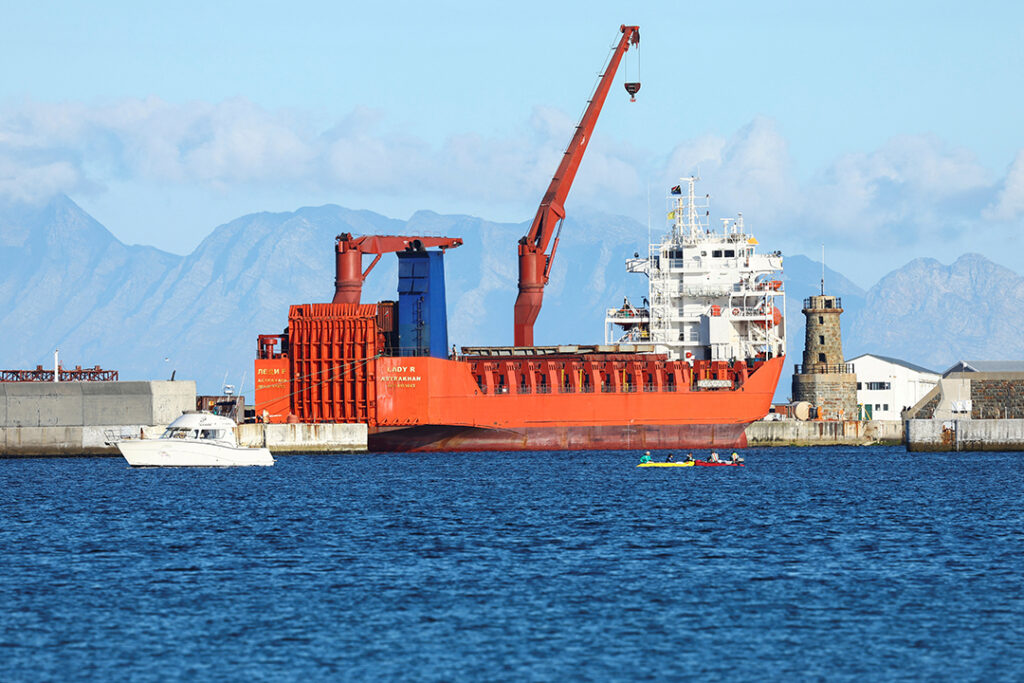ADF STAFF
The mystery of a Russian cargo ship docking at South Africa’s largest naval base in early December did more than spark concerns of opaque weapons trading.
It has renewed focus on the still-smoldering accusations of corruption and outsize Russian influence that dogged South Africa for years.
On December 6 under cover of darkness, the Lady R cruised into Simon’s Town with its identification transponder switched off. The vessel has been internationally sanctioned as part of Russia’s military export-import business since Russia invaded Ukraine.
Citizens saw cargo unloaded with armed guards looking on.
“We are aware that munitions were offloaded,” politician Kobus Marais said in a statement. “Clearly we are aware that they were transported and delivered to a specific ammunition depot in South Africa.”
After two weeks of silence, the defense minister confirmed that the Russian ship delivered ammunition.
Like many South Africans, Marais was left with troubling questions.
“Why is there so much secrecy; why do this in the middle of the night?” he told CTV news. “That clearly supports the narrative that something has been done irregularly and most probably illegal as well.”
The lack of transparency harkens back to the not-too-distant era of “state capture,” a phrase synonymous with the looting of South African resources by citizens with political connections.
But the concerns are rooted in the present.
South Africa abstained from all United Nations’ votes on Russia’s invasion of Ukraine throughout 2022 and repeatedly refused to condemn the military aggression.
Today, more and more South Africans have raised alarms over Vladimir Putin’s lingering autocratic and corrupt influence, which was most evident during the administration of former President Jacob Zuma.
Some called Zuma’s government “compromised” and noted there was a stark inclination toward autocratic rule in his second term.
In 2017, opposition party members characterized Zuma’s approach to governing as “an attempt to emulate a Putin-style authoritarian, low-intensity democracy, with meetings reported between this faction and their counterparts in Russia.”
South African political journalist and author John Matisonn warns that such meetings continue to this day.
“Anxiety about Putin-style corrupting influence on South African institutions goes far beyond the Russian nuclear deal, the poster child of state capture that eventually derailed Jacob Zuma as president,” he wrote in a December 12 op-ed for The Daily Maverick newspaper.
Matisonn also called Zuma’s radical restructuring of South Africa’s intelligence sector, specifically the State Security Agency (SSA), “disturbingly similar to Russia’s.”
According to investigations and government inquiries:
- The SSA intervened in internal politics to aid Zuma.
- It was authorized to create “revenue generating” businesses.
- Agents’ oaths were changed to swear allegiance to the president.
Zuma, a former intelligence chief for his political party, received some military training in Russia and had at least 13 known meetings with Putin, a former KGB operative who became the leader of the KGB’s successor, the FSB.
“What Putin and Zuma seem to have in common is cynicism about the values underlying democracy,” Matisonn wrote. “But Zuma was stopped in part because our constitution and civil society are both much stronger here.
“State capture was a blemish on the system, and enough checks and balances were applied to stop it.”
Former South African Revenue Service Deputy Commissioner Ivan Pillay, who jousted with Zuma repeatedly, says South Africa is still at the beginning of its fight against state capture.
“We have a long way to go,” he said in a December 15 interview with policy and legislation resource polity.org.za. “Some of the state corruptors have been removed from office. Many still remain. Moreover, the corruption has penetrated to the lowest levels in the institution, so that potentially now any transaction has the potential to be corrupted.
“We can’t just say we are fighting corruption. It’s not sufficient. The fighting of corruption has to be combined with fixing the institutions, and I fear we’re not doing enough of that.”

